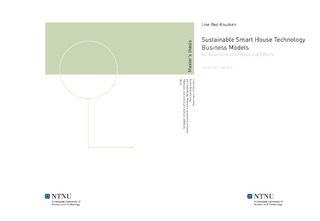Sustainable Smart House Technology Business Models: An Assessment of Rebound Effects
Abstract
Smart House Technologies have in earlier research been put forward as an effective measure to reduce CO2-emissions. A rebound effect is defined as the change in energy demand caused by changes in consumer behavior. This behavior occurs when energy efficient technology such as Smart House Technology is introduced. Energy efficient technology has been found to stimulate increased usage through the appearance of new services and usage areas. This leads to an increase in overall energy demand, causing a take-back in energy efficiency called a rebound effect. This thesis has conducted an analysis on potential rebound effects from Smart House Technologies. The analysis is based on a constructed case study and interviews with users. This research shows that people tend to react positively to feedback on energy consumption. By incorporating this into business models wanted rebound effects towards increased environmental awareness by the users can be enhanced. Another finding was that measures should be taken by Smart House Technology providers to prevent direct cost-savings to reach the users and cause unwanted rebound effects from wealth maximization. The results have been discussed at micro- and macro-economic levels. A suggestion for a sustainable business model at the micro-level is presented. The suggested business model is an environmentally friendly bonus point scheme. The scheme can be utilized to capture the free cash from energy savings achieved with Smart House Technology. Customer relationships, partner networks and revenue models were identified as the three elements in Osterwalder's business model ontology that considerably influence rebound effects arising from the use of Smart House Technologies.
